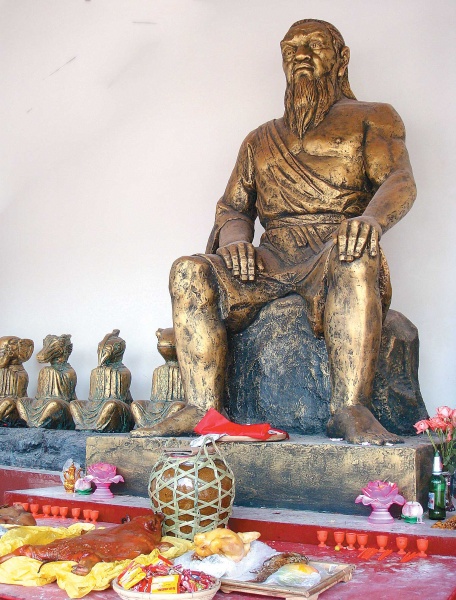Epic of Buluotuo records wisdom of Zhuang people

The deity Buluotou was the first mythological ancestor of Zhuang ethnic group. He is not only regarded as the creator of the world but also a cultural hero, respected and worshiped by Zhuang people.
The epic of Buluotuo is a general name for the holy text of the Mo religion that is based on the eponymous deity Buluotou and is a part of the culture of the Zhuang ethnic group. Buluotuo is a transliteration from the Zhuang language, meaning “the first ancestor (or tribal chief) in the mountains.” The line “Go ask Buluotuo, go ask Molujia” often appears in the text to underline the extraordinary wisdom and power of Buluotuo and his spouse Molujia, expressing the Zhuang people’s infinite respect for them.
People who can understand the epic of Buluotuo are usually clergy known as Bumo, who are part of the Mo religion, an original folk religion of the Zhuang ethnic group. The Bumo passed on the epic of Buluotuo by ear, oral instruction or handwritten manuscripts to later generations. The handwritten manuscripts adopt ancient Zhuang characters which took shape in the period of Tang (618-907) and Song (960-1279) dynasties. Ancient Zhuang characters borrow Chinese characters’ components and recombine them in order to express the Zhuang language’s pronunciation and meaning. The earliest handwritten manuscript of the epic of Buluotuo can be traced back to the year 1813 in the Qing Dynasty (1616-1911).
The epic of Buluotuo has been hailed as an encyclopedia of Zhuang society, and its content mainly focuses on the creation of the world and heroes’ conquest with various styles and distinct narratives. Buluotuo originally came from the totem worship of a bird and then evolved into the ancestor god of Zhuang people.
Buluotuo is not only a creator of the world, but also a cultural hero in Zhuang people’s hearts. In the epic, Buluotuo helped the Zhuang people create Mo religion, characters and calendars, appoint emperors and hereditary headmen to manage society, arrange the world’s order and solve difficulties for people.
Li Siying is from the Institute of Ethnic Literature at the Chinese Academy of Social Sciences and Li Jun’an is from the Nanning Academy of Social Sciences.
